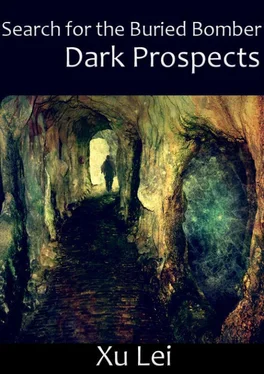He was right. And after making it here, she realized immediately that the apparatus beneath the sectional map was the control box. She wiped the dust and read the labels until she found the switch controlling the caissons. She knew what she was looking for and so left the other machines untouched. “Regardless of who it is specifically,” I said, “there’s definitely something strange going on. Maybe it really is a Japanese spy. It was probably this person who murdered the young soldier in the warehouse. The ruination of the first team and their ultimate failure to complete the mission was also likely the work of this agent.”
The two of them nodded.
“We don’t know where this woman is,” said Wang Sichuan, “but maybe she’s still nearby. We might be about to run into her.”
“Should we head back and grab the rifle so we can defend ourselves?” I asked.
“We still don’t know for certain that we can get out through the lower room,” said Ma Zaihai. “If we can’t, then we’ll have to come back the way we came. If we take down the gun, it’ll be very difficult to climb out of here.”
“Then we’d better be extra careful,” said Wang Sichuan.
Ma Zaihai was the first down the ladder. After he reached the bottom and confirmed no one was there, the two of us climbed down. This room was nearly twice the size of the one above it. Six transmitters were arrayed along the wall nearest the dam’s exterior. Stacks of telegrams were strewn messily atop them. Ironwork desks piled with dust-covered documents took up the rest of the space. This has to be the dam’s command center, I thought. A huge blueprint of the underground base hung on one wall, identical to the one Old Tang had found but much larger. Wang Sichuan spied a microphone sitting atop one of the long tables against the wall. “This has to be where they read the emperor’s letter of surrender before they withdrew,” he said. He tried to convince Ma Zaihai to switch on the mike, but after he’d fussed with it for some time, the power light remained off. It appeared completely ruined.
I told them to stop walking around. I scanned the room with my flashlight. Sure enough, there were two sets of footprints heading in two directions: one to an ironwork double door, the other to a dark green wooden door. The ironwork doors were clearly blastproof, probably with some corridor beyond. What was behind the wooden one? A bathroom? We walked over and opened the green door. It was an office.
Dust filled the room. The furnishings and decor were very simple, though traces from where decorations had hung could be seen on the walls. Japanese swords, most likely. A dust-covered military uniform of some unknown rank hung in the corner. All over the room was evidence of dust disturbed. We followed a trail of handprints but found only a large stack of documents. We didn’t speak Japanese, nor were we historians, so the papers were useless, but apparently somebody was very interested in something they thought was in this room, though they didn’t seem to know exactly where it was.
We left the room and followed the other trail, toward the iron double doors. It was as I’d expected. After pushing them open, we were greeted by a long, pitch-black hallway. I shined my flashlight down it. Some footprints ran down the corridor, others into the room behind us. There had to be an exit ahead. We took off without a second thought, following the footprints into the darkness. Before long the corridor branched in three directions. The footprints ran down each one. Unable to determine which was the right path, we had no choice but to investigate them one by one. Our first selection ended in a power distribution room. Switches filled every inch of it.
“Why not try and flip a few?” said Wang Sichuan.
“Absolutely not,” I said. “If they turn off some important mechanism, the compression engines in the icehouse for example, then the devil only knows what the consequences will be.”
We returned to the fork and took the second corridor. We were soon standing before an iron door, triple-proofed, just like the others, and terribly thick. In a battle, every space in here would become a very-difficult-to-capture bunker. The big guy pushed the door open. Inside was a great hall. We swept our flashlight beams across the room.
I’m taking such pains to relate our search for the right path because it really was so critical. Later, while giving a summary of the incident, we felt some residual “fear after the fact.” Had we not checked all the corridors, had we found the exit on the first try, then the true, hidden face of this sprawling underground bunker would have remained forever concealed. So often one’s choice can change so much.
Past the door we saw a strange room. It looked so familiar, as if I’d seen it only recently. We walked inside. On the wall directly across from us hung a square curtain, fifteen feet in both length and width. Numerous low seats filled the room, and at its rear rested some strange apparatus. I walked straight over to the front of the machine. It was a miniature film projector. I hadn’t known film projectors this small existed until I watched the Zero Film back on the surface. Could this be the underground base’s movie theater? Was this where their superiors strengthened the soldiers’ brainwashing and savagery? Looking back at it now, it was probably where the Japanese soldiers came to relax and have fun. In those days, though, our concept of the Japanese didn’t allow for them taking part in recreational activities.
I was extremely curious about the little projector. Taking a closer look, I discovered it had been wiped clean of dust. Whoever was here before us must have been interested in it as well. I checked it all over. Sprouting from the back was a very familiar-looking shape. It was a circle with a spool in the middle, like you could hang something off it. This was uncanny. This feeling of familiarity was different from the sense of having seen this room before. It was a kind of anxiety, as if there were two electrically charged pieces in my mind about to touch and they were sending sparks back and forth. I needed to remember where I’d seen the thing. It was terribly crucial. I could feel it.
I called Wang Sichuan over and he motioned to Ma Zaihai. The three of us put our heads together. It came to Ma Zaihai at once. “The iron case! The shell-like iron case the female corpse was carrying. Maybe it attaches onto the projector.”
No way, I thought. The iron case had looked like a snail shell. That case could be attached onto some component of the projector? Suddenly I realized what was wrong. The case wasn’t a part of the projector. No, by God, but within that iron case was none other than a roll of film!

CHAPTER 50

The Film Canister
The three of us looked at one another, unsure what to make of our discovery. I sat down and forced myself to think things over. Now that we understood what the iron case was, a number of clues began to fit together. We knew how it all started: the only reason the Japanese established this base and transported the bomber down here was the void. How they’d discovered the place, we didn’t know. Perhaps while prospecting for oil or coal deposits they’d simply happened upon it. The original motive was unimportant. For in any case, upon finding the abyss, they’d obviously become consumed with the desire to know what was hidden in the outer-space-like darkness beneath this mountain.
They then used the Shinzan bomber to explore the abyss. Naturally, they would never have relied on the naked eye for the results of this survey, so aerial recording equipment must have been affixed to the Shinzan. For some reason the base was suddenly abandoned after the plane took off. Lacking guided navigation, the Shinzan crashed into the underground river. Buffer bags stuffed with Chinese corpses had been sunk along the watery runway, so the plane was not completely destroyed. While others might have sustained injuries, there was only a single fatality—the twisted corpse of the pilot we discovered in the wreckage.
Читать дальше














